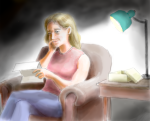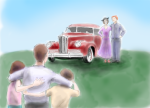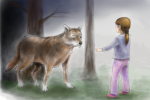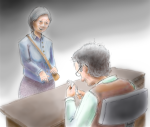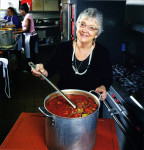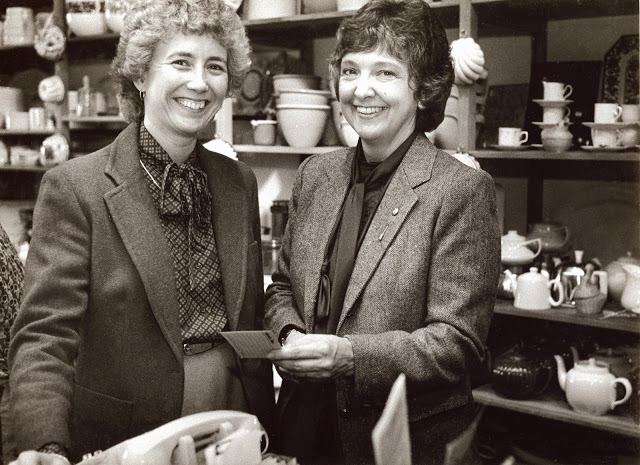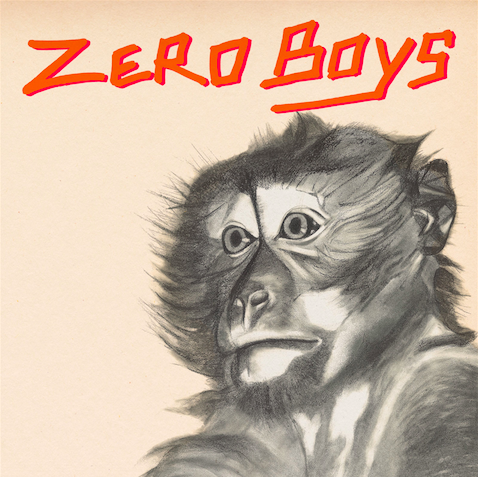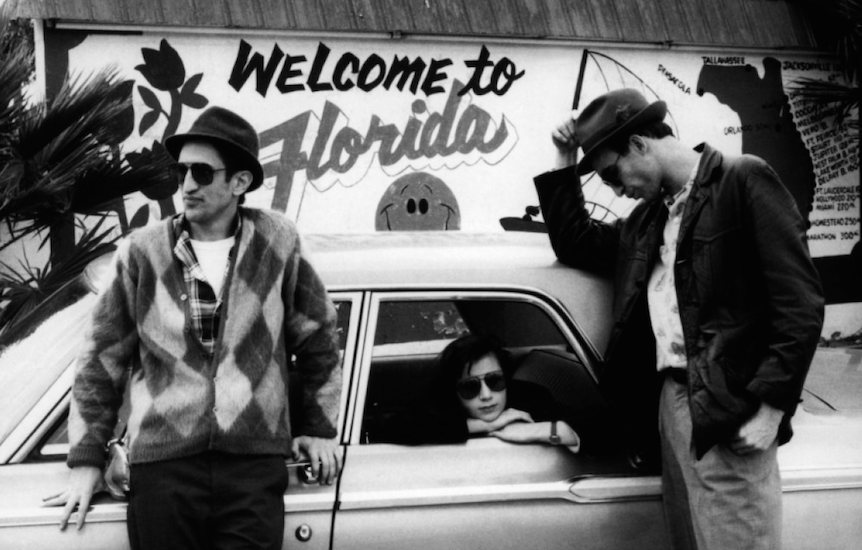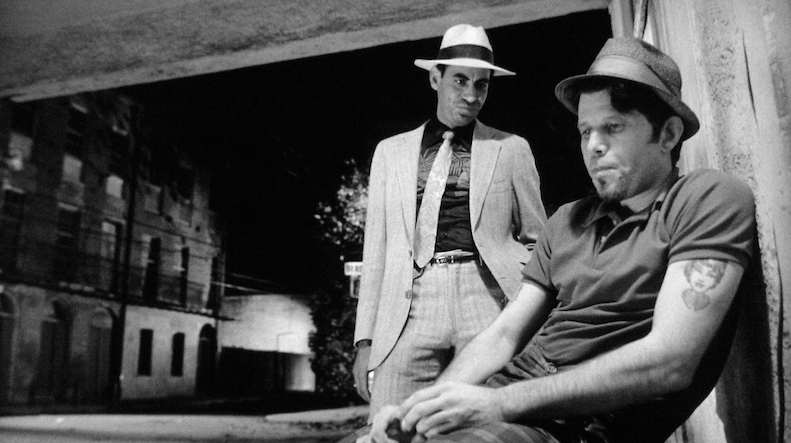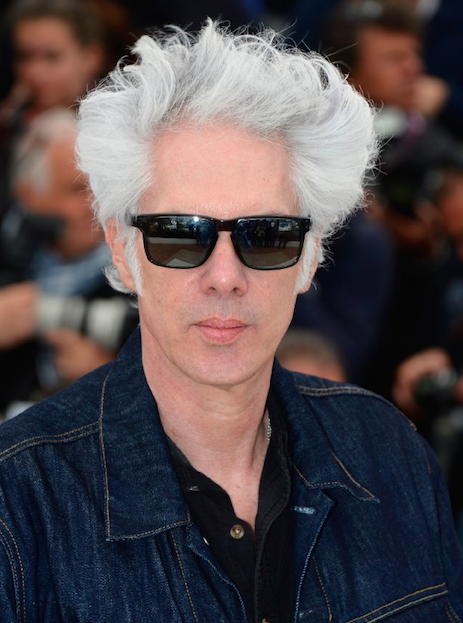by Richard H. Durisen
“When angels fell,
Some fell on the land,
Some fell on the sea.
The former are the faeries,
And the latter were often
Said to be the seals.”
— Orcadian Folklore, Anonymous
The drone of approaching Heinkel bombers echoes in the fjords. A fireball erupts when the first bomb hits, flinging bodies into the sea….
Rose awoke on her lumpy mattress, startled and sweaty. Large waves boomed against the rocks, and the grief that had clotted around her heart during a night of intermittent sleep melted and flowed back into her veins. It was the dream about the bombers that had awoken her. Previous dreams had presaged discoveries on the beach, and climbing out of bed, Rose asked aloud, “Mum, do ya have a gift for me today?”
After putting on her work clothes, Rose took the hemp sack with rope shoulder straps down from its hook and, in it, put a jar containing a rag moistened with vinegar. She slung the pack on her back and walked toward the ocean. Today, the fog had drawn back from the coast after dawn, and the sky was an unusually deep blue. Far out to sea, a Vickers Vildebeest biplane flew along the coast, patrolling for U boats.
The rolling hills of scrub and verdant grass ended abruptly at the water, as if loaves of bread had been carved in a ragged line. Rose’s house topped one of the nearest hills. The closest other visible building, Old Tom O’Malley’s house, was about a third of a mile away up along the coast.
Rose stood at the top of the precipice nearest her house. It dropped straight down into Donegal Bay off the Irish Sea and was part of the Slieve League cliffs. The locals called this particular cliff “Imeall”, which in Gaelic means “Edge” or “Margin.” Many an afternoon or evening, long before the troubles began, she and her sister would sit here to ponder the mysteries common among young Irish women –their bodies, men, America.
Something glinted below her, where the waves foamed over a rocky beach within the steep sides of a cove. The path down to the cove was treacherous, but Rose was well practiced from her childhood days. When she saw up close what was caught in a rough edge of the tide pool, a mixture of horror and elation raced through her body, and she wept.
She tied the cloth dampened with vinegar over her nose to mask the stench, hefted the object into the sack, and then began the climb uphill. As she approached her house, she recognized her brother in the distance, bicycling along the coast road for one of his frequent visits. Anxiety crackled through her. She could not let Sean reach the house before she did. She ran.
Back home, she retrieved the sealed container of lye and the key that she kept near the Book under her bed and hurried to the back of the house, to the large trunk beneath the eaves. She unlocked it and swung open the lid. The pungent air made her wince and cough a little. She unloaded her sack, took off the military cap, gazed longingly at the decomposing head festooned with seaweed, and laid it gently in the box. She sprinkled some lye on top of all the trunk’s contents and closed the lid. She also scattered some lye over the fluids leaking from between the thick wooden slats and paused for a moment. “They’re back together again, Mum, like ya said.”
Once back inside the house, she hung the hat behind a curtain that partitioned off one corner of the main room. She shut the windows on the trunk side of the house, cleaned up as best she could at the basin, and put water on for tea. Moments later, Sean’s wheels clattered on the path to her house.
“Darlin’ sister, ya need to take better care a the place. It smells to High Heaven, ya know.”
“The compost needs a bit a straw.”
“Straw? A healthy dose of buryin’ it needs… Well, I brought what food I could, an’ some laundry. Ya know how bad ‘tis with the Emergency an’ all. U boats. Patrol planes. As if a fisherman’s life isn’t hard enough. We ought ta leave this damn place. Go North.”
“Never.”
“People talk, Rose. ‘Tis hard to find customers for yer washin’ anymore.”
“Oh, they talk, do they?” Rose said, with a forceful “Heeeck!” at the end, a guttural sound, like a cat choking up a hairball. Her eyes flashed, “And what is it they’re sayin’?”
“Feck, ya know. Dumb rot. Yer a witch an’ all. Or a Selkie.”
“Selkie, me arse! Ya mean Finfolk! Sami! Heeeck! Like Mum!”
“Yeah, Rose, like Mother. God Rest Her Troubled Soul.”
“’Er soul isn’t troubled, Sean. Not the way ya mean it, anyhow.”
“An’ how would ya know that? She jumped off the damn cliff, she did. She’s as lost as Father was in the Great Storm a ’38, a Godfearin’ Man, Bless his Soul.”
“Ya don’t know it. No one saw ‘er. Went back to ‘er home is all she did.”
“Aw, Rose, ya know what they said about ‘er. They’re sayin’ the same about ya now. I fear someone’ll get a notion. And where’s Mother’s home, if not here?”
“Ya know’t in yer heart, Sean. Ya just won’t admit it.”
“Rose, ya talk crazy. She’s County Donegal right through.”
“Where’s ‘er folk then, Sean? How come Mum an’ Dad never talked about’m? Ya heard the stories of him goin’ out in the boat and comin’ back with ‘er. Mum’s from Inse Catt way back, an’ ‘er Folk are Lochlann Sami, the Finnar, belongin’ to the sea.”
Sean ignored Rose’s occult version of their family history and continued, “Rose, ya wander around all day mutterin’ an’ givin’ folks the eye. Ya sit on the beach whisperin’ to the seals. An’ at night ya stand on Imeall there keenin’ like a Banshee. Just like Mother, when Father died. Folks talk, Rose. Ya know what they think? About Mary?”
“Sean, I didn’t kill Mary. Heeeck! I’m guilty a other things, but not that.”
“Aw, Rose. Ya know. It’s people that’re saying, not me.”
They sat in silence for a while. Then Sean reminisced a little about their childhood and was surprised that she smiled thinly and even chuckled once. Before today, the weight of everything had seemed to crush the joy right out of her. They fell into a reverie and stared out the window at the horizon.
When Sean spoke again, it was to update her on the news: another volunteer from the village wounded, more difficulties with the food supplies, another Luftwaffe bombing of Dublin, rumors about when the Americans might enter the war.
“Oh, an’ Joseph says he needs his wash done quick this time, for Sunday Mass. He’s still sweet on ya, ya know, no matter how daft ya be, an’ even with all that’s happened. An’ I added me own best shirt to the load. The stain is a bit a blood from a scuff at the pub. Defendin’ yer name, if ya must know.”
“Certainly nothin’ new, that. Thank ya, Sean, but I don’t need defendin’. Tell Joe I’ll get his cloths to him quick this time. Tell’m he’s a good man too.”
They lapsed into another silence filled by the surf and by the distant barking of seals. Sean sighed and stood up to leave.
“Bless ya, darlin’ sister! May God Look Over Ya!”
“I don’t know about God. Heeeck! But Mum does.” Rose held up the wood carving of the Celtic knot that her mother had given her and that she always wore around her neck on a leather strap.
“I worry about ya being alone an’ all. I think it’s makin’ ya daft.”
“I’m not alone, Sean.”
Sean creased his brow. “The way ya talk, it scares me, Rose. I swear. Ya’ll make me a drinkin’ man for sure.”
“Yer already a drinkin’ man, Sean.” Rose paused and added, “An’ bless ya too. Yer concern touches me. Ya have Dad’s soft heart, but deep in yer soul I think ya got more a Mum in ya than I do. Ya just don’t know it.”
With that, he smiled, gave her a long hug, and left. Before he rode his bike down the hill toward the road, he yelled, “May The Saints Have Mercy, Rose, it stinks like the docks out here! When next I’m back, I’ll help ya with the compost!”
“Thank ya, Sean. Yer right. I’ll need a bit a help with that.”
Rose sat back down in the kitchen after Sean left and ran her fingers across the rough tabletop. Splinters poked at her fingertips, and she toyed with the hints of pain.
It had begun two years back, in 1939, on the night of Paddy’s send-off party. After mourning the loss of their parents for a year, Rose and Mary were ready to let go for an evening. When they arrived at the pub, they seemed, even to Rose, to be an unlikely pair. Each was beautiful in her way, but Mary was tall and solidly built, robust, with red hair and a ruddy complexion like her father and brother. Rose took after her mother – dark, exotic, and elfin. Her protruding almond-shaped eyes slanted slightly downward at the edges, and she had unusually pronounced webbing between her fingers and toes, a trait she shared with her mother.
Mary spent most of her time at the gathering sitting near the bar, talking and laughing with Paddy. Rose was the more spirited and mischievous of the two, and her deep brown eyes and long shiny black hair flashed with inner fire. She let herself be carried away by the music and drink, spinning her skirt out shamelessly on the dance floor, hissing into young men’s ears, and downing all the beer and whisky she was offered.
Paddy was going to war, one of the early Irish volunteers. He was the handsomest man in the village, desired by all, and betrothed to Rose’s sister Mary. Rose had been happy for them, despite the grim reports of war coming from the Continent, but tonight her spirit was set free by the alcohol. When Paddy left Mary at the bar to join the dancers, Rose whirled over to him through the crowd. They danced a vibrant reel together and everyone cheered, including Mary. Once the music stopped, Rose and Paddy laughed at each other through their drunken fog. Later, as the whisky overcame Rose, her legs began to buckle and she could barely stand. Paddy told Mary he would take her sister home and then come right back to the pub.
Since the loss of their father at sea and the subsequent disappearance of their mother, Mary and Rose had been living alone on the hill near Imeall, well outside the village. Paddy borrowed the baker’s lorry and drove it somewhat recklessly along the coast road. The final walk up the path to the house was strenuous, but Rose was light and Paddy strong. Her warm body next to his and her arms around his shoulders stroking his broad back stirred a sweet and dangerous yearning. At the house, he laid her tenderly on her bed, and she smiled up at him with half-lidded eyes. The Celtic knot lay between her breasts. He professed in tears that it was she he truly loved, not her sister. He had courted Mary just to be near Rose, but had been too afraid to approach Rose directly because of her wildness.
As she listened, Rose knew that she had wanted this to be true. She had often lingered over elaborate daydreams that ended with the two of them entwined like vines. She had even muttered to the Book a time or two, at the page of forbidden love, but never really believed there was any harm in it. Mary was her sister, a soul mate, and Paddy seemed totally devoted to her. Despite the spinning in her head, her stupor cleared enough that she could remember giving joyful consent. Their love was fierce and deep, and quickly consummated. Paddy had to reappear at the pub. He promised to write and straighten it all out, and she gave him the Celtic knot as a token of their new commitment. Paddy went back to his sendoff party and left early the next day for the Irish Guards.
It was a few months before Paddy’s first letters reached Mary and Rose, and they ignited a firestorm. Mary left the house in a fury to live with Paddy’s mother. She took to shouting dangerous things in public about the Book, about ancient chants and spells, about their mother teaching Rose the old Sami ways. Even though Paddy’s letter asked Mary to give the betrothal ring to Rose, Mary refused, appealing to Father O’Connell to exorcise the Devil from Rose and release Paddy from her spell. Rose ridiculed the priest but knew in her heart that her defiance vented from deep levels of shame and remorse.
The conflict raged for the better part of a year. In an effort at reconciliation, Rose asked Mary to meet her at Imeall one afternoon, and, to Rose’s surprise, Mary agreed. The sisters sat at the brink of the precipice and looked out toward the seal rock, trying to let the ocean breeze blow away some of the bad feeling. The betrothal ring on Mary’s hand sparkled in the Sun.
“How could ya do it, Rose? ‘Twas the Book, it was. Mother’s damn Book. Ya should burn it.”
“Don’t speak so a Mum’s Book, Mary. ‘Tis dangerous. But in truth, about Paddy, I love’m. ‘Tis no more Magic than ‘tis a human thing, ya know. I couldn’t help it. I feel a twistin’ in me gut about hurtin’ ya, but ‘tis in the world now. The Book only helped t’show what was.” Though her words held conviction, Rose felt mostly helpless as she stared out at the sea. A lone seal barked far away.
“Nae, Rose, by all that’s holy, Paddy’s mine. Father O’Connell, he says it. The whole town says it. Ya know what’s right, Rose. Ya know what our Father woulda said.”
Rose stood up. “Father were a good man, but I spit on the feckin’ priest. Heeeck!” And Rose spat on the ground. “Look a the sea, Mary. It don’t owe a thing to the Christ a Galilee. ’Tis the heart an’ spirit in all things, Mary. ‘Tis what matters. ‘An the sea says Paddy’s mine now.”
“The sea. Priests. Books. I spit on’m all, I do. Family, Rose! Yer me sister. How could ya betray blood between us? All me life, I thought ya loved me.”
“But, Mary, I love ya true, but what I feel about Paddy, it’s real too… If Paddy loves us both, maybe we both can have’m. ‘Tis a more common thing then people like t’say. ‘Tis only priests and matrons say it can’t be.”
With this, Mary’s face flushed crimson, and she jumped to her feet. “Rose, I won’t have any more a this crazy talk. If yer thinkin’ like this, yer no sister I know. ‘An I curse yer Mother’s Book. ‘Tis Devil’s work. She should not have given it to ya. It’s made ya witchy and dark like ‘er, it has. She’s no more me Mother, too. Poor Dad, God bless his soul. I’m goin’. I won’t speak t’ya no more.”
“Heeeck! Mary! Ya don’t know what yer sayin’!” Rose turned to the sea, “Mum, she don’t mean it!”
Mary started to leave. Rose, in desperation, grabbed Mary’s wrist and begged her to stay. Mary screamed and yanked her hand back. The cliff shifted beneath them after a particularly large wave. The rocks under Mary’s feet suddenly gave way. At the same moment, Rose lost her grip on Mary’s arm, and Mary toppled into the void beyond Imeall.
“Oh, Mary! Oh nae, Mum! Nae!”
The seals on the rock began to bark loudly, then jumped into the sea and swam toward the cliff. Rose collapsed, sobbing.
After heating a piece of toast over a burner of her stove, Rose began to work on the laundry that Sean had left. Being occupied with this mundane task kept her calm in the face of what she intended to do.
As she cranked the clean clothes through the wringer, a gull came looking for a snack in her compost pile and called out as if in answer to the squeaky rollers. Tears formed at the corners of Rose’s eyes. For someone with so much life squeezed out of her, Rose was amazed at how much and how often she was able to cry. She made a quick and thorough job of the washing before she lost the afternoon sunlight for drying. The clothesline was well away from the house, and a strong wind was blowing out towards the ocean. One by one she fought to attach the clothes to the line. It was as if all of them were trying to reach the sea.
Old Tom O’Malley had claimed that he saw the whole argument from his house and that Rose had bodily thrown Mary to her death. This seemed preposterous to some, because Rose was so much smaller than Mary, but it confirmed the worst thoughts of those who believed that Rose could summon unnatural powers. Rose pleaded for people to believe that Mary slipped on loose stones, and, in her grief, she swore it on her father’s honor. Although disconsolate at the growing losses in his family, Sean defended Rose, with his fists if he had to. He, with other fishermen, searched for Mary’s body by day, and by night he drowned his sorrow – for Mary, for Rose, for his parents – in generous amounts of Guinness and whiskey, to the point where Avril, his wife, left him and moved back to her family in Letterkenny.
Rose wrote to Paddy as clearly as she could about what had happened. She trusted in her pleadings with the Book and in Paddy’s love that he would believe her, but Paddy’s feelings became twisted by his own guilt, and in the end he accepted the version of the story written to him by his mother. In his last letter to Rose, a few months after Mary’s death, he condemned Rose for a witch, renounced his vow, and returned the Celtic necklace. A monstrous anger ignited within Rose, and she said fiery and explosive words, by candlelight, over the darkest pages of the Book.
Soon after, in June 1940, official news of a calamitous event cast the deepest shadows over the village and blackened Rose’s soul. As reported in The Donegal News & Derry People:
“Shortly after midnight on May 15, while carrying the 1st Battalion Irish Guards of the 24th Brigade, the H.M.T. Chrobry was attacked and set ablaze by German bombers near Skaanland, Norway. Paddy Maquire of the Slieve League region, originally of County Fermanagh, is officially missing at sea, presumed dead. All other volunteers in the 24th from County Donegal survived, but the following were injured…”
Paddy’s body was never recovered, but an eyewitness from the village said in a letter home that he had seen him blown clean off the vessel.
When she heard about Paddy’s fate, Rose detached herself completely from the world of ordinary folk. She wore the Celtic knot always, even when swimming in the sea, and she spent much of her time wandering alone on the beaches and cliffs, talking to the seals in the water, sometimes with the Book in her hands. After the first time she had the dream about the bombers, a gift for her arrived on the beach in the cove near her house. A voice coming from the water told her then what she had to do to put everything right.
The clothes dried quickly in the strong breeze. Before sunset, Rose ironed them, wrapped them tidily in brown paper, and penciled Joe’s name on the bundle. She put Sean’s shirt on top and left it all on the shelf by the door. Then, with heavy heart, she turned to the task ahead.
“Mum, give me strength.”
Before the sunlight faded, a Waxing Moon, almost Full, rose over the hills and shone into the East windows. Rose gathered cleaning liquid and a candle for extra light, retrieved the army cap from behind the curtain, and sat at the table. She carefully removed the tarnished cap star of the Most Illustrious Order of St. Patrick from the hat and cleaned the wool and the metal star as best she could. She rubbed some grease on the visor to bring out a shine. Rose walked, with the hat, back to the corner of the room and pulled the curtain back entirely.
Hanging there in the corner was an essentially complete battledress uniform of the 1st Irish Guards. It had rips, holes, burns, and stains that Rose did not have the material or skills to fix entirely, but she had done well enough to honor who and what it represented. She even had the boots and the Sam Browne belt with cross strap. She put the hat with the uniform and left the curtain drawn so she could see it all hanging there. Then she reached in the jacket pocket and pulled out Mary’s betrothal ring.
Rose went into her bedroom and brought out a sheet of paper, an envelope, her mother’s Book, and the key to the trunk. She set the cap star and Mary’s ring next to the Book in front of her. She paused a long time, not sure what to say. Sean would have a difficult time no matter what she wrote. By force of habit, beat into her by the Sisters of Mercy, she put her best Catholic schoolgirl English into the letter.
Dearest Brother,
I’m sorry to burden you, Sean. If the sea doesn’t keep me, bury me here, near Imeall. I’m leaving Paddy’s St. Patrick’s star and Mary’s ring. These were gifts. I didn’t steal them. Some night soon, nail them to the trunk out back, weight it with stones, and throw it over the cliff. I am not strong enough, but it must be done. I won’t rest in peace unless you do it. Please don’t look inside. You don’t need to know what’s in there. Bury Mum’s Book with me, so it causes no more harm.
Sean, you’re a blameless soul, like Father. Pray for us all in your own way. I hope Mum helps you like she helped me. If all goes as I’ve been told, there will be signs of healing, and you’ll know I’m happy.
Love,
Rose
When she was done, Rose put the letter, the star, and the ring in the envelope and sealed it. She picked up the Book. It glowed in her hands as she opened it for the last time and turned to the last few pages, the ones that dealt with the hardest things. She read the old runes in a whispery chant and invoked the names of her mother, Mary, and Paddy. She paused for a minute, added a few whispers for her father, and then surprised herself by reciting the Lord’s Prayer for him dutifully, like a good daughter.
The Moon was approaching the meridian in the Southern sky. It would soon be midnight. Rose got up from the table and went to the basin, in which there was still grey rinse water from the laundry. Leaving the Celtic knot around her neck, she undressed, got a washcloth, and fit herself into the tub. She cleaned herself slowly and thoroughly and brushed her hair clear of tangles.
When she stood up, with bubbles of foam slipping down her back and thighs, her skin shone like varnished wood in the combined light of the candle and the Moon. She dried herself and walked to the corner where the uniform hung. After gazing for a while at the marvel of it, she began to put it on. The wool felt scratchy as a hair shirt on her bare skin, and she relished the faint odors that clung to it, odors of death and the sea.
The uniform was oversized for her, but she cinched it up with cords. She grabbed the trunk key from the table and put it in the jacket pocket, hoping to make it more difficult for Sean to look in the trunk by taking the key with her. She wore several pairs of socks to make the boots fit tight, and, even with her hair folded up into the hat, she had to stuff in wads of paper to set it firmly on her head. When she judged by the location of the Moon that it was midnight, she went outside and walked to Imeall.
Lingering above the roaring surf, Rose poured out one long howl. As the echoes died away, she felt finally at peace again with the cliffs, the stars, the Moon, and the sea. Rose murmured the Sami words for Moon, Sea, and Mother. “Mannu… Mearra… Eadni.” As she leaned over Imeall and surrendered her balance, she called out: “I’m only half Finfolk, Mum, but let me be near ya always!”
At about noon the next day, Sean found and opened the envelope. When Mary’s ring dropped out, he felt a chill run down his spine. After reading the letter he started shouting his sister’s name and ran to the cliff. He scanned the coast until he saw Rose’s body wallowing in a tide pool in the cove. As he scrambled down to the beach, his adrenaline rush turned to dark bewilderment when it became clear to him that his dead sister was wearing an Irish Guard uniform. Although he knew that she had probably been dead for many hours, Sean dragged Rose from the pool and tried to revive her. Then he rocked her in his lap and let the tears stream out.
A plan solidified in his mind. He knew that if any of the villagers saw her dressed like this they would believe it to be a truly horrible form of devilment, confirming the worst that they had always thought about Rose and his mother. Although he was now thinking the same dire thoughts, he could not allow others to dishonor them.
Fortunately, Rose was relatively light, even wearing a wet woolen uniform. He slung her over his shoulder and held her there with one hand while guiding himself up the treacherous path with the other. When he got to the house, he laid out some rags and towels and put Rose’s body on the floor. He then gathered some of her work clothes, which he found lying next to the half full washbasin, and hurried back to the cliff and down the steep path to the beach. He drenched her clothes in the surf and returned to the house.
Changing Rose’s clothes was a challenge to his modesty, but he treated it as a funeral rite and tried not to dwell on her body. He did notice, however, that she had remarkably few bruises and contusions for someone who had jumped from a cliff. It also surprised him that she was not wearing the Celtic knot he had always seen around her neck for the past year.
The military hat came off easily in his hands. It was hard for Sean to believe it could it have stayed on her when she hit the water or when the violent surf tossed her about on the rocks. He found the key in the jacket pocket as he was folding the uniform, and he laid it on the table, with a passing hint of curiosity.
When Sean was done, he gathered up anything others might find suspicious – the uniform, the Book, Rose’s letter, the star, and the ring – hid them next to the trunk out of sight, and then pedaled into town. Sean knew that Rose wanted to be buried near the ocean and not in the Catholic cemetery, but he could not show anyone her strange letter to confirm her suicidal intent. Fortunately, although he had no concrete proof that he could share, it turned out to be an easy thing for the villagers to accept.
Rose was buried the next day, during a light drizzle, on a flat area down away from her house in the direction of Imeall. About a dozen people attended, mostly men showing their support for Sean. Several of them, like Joseph, had also been sweet on Rose, attracted by her exotic darkness and flirtatious nature. Three of the swarthy fishermen who had helped dig the grave, including Joseph, offered to shovel it in, but Sean declined. He told them he wanted to finish the job by himself, and he promised he would meet his mates later that evening in the pub for a proper grieving.
Once everyone was out of sight, Sean took the pile from next to the trunk and sat with it at the kitchen table. He put the letter, the star, and the ring aside, next to the key. The Book was bound in brown sharkskin leather, now splotchy with age. Celtic patterns lavishly embossed on the cover were interwoven with other symbology, embellishments that had a more eldritch look and seemed disquietingly familiar, as if from memories of childhood dreams. The pages inside were richly illuminated to suggest what the ancient runes on them might be about. What had seemed at first to be pages drab with age began to sparkle in extraordinary colors that shone from inside with their own radiance.
Sean’s trance did not snap until some time later, when he turned the last page and closed the Book. Although he could not read the runes in a conscious way, somehow the Book had made sense to him. “Mother a God, protect me,” he murmured. Then he heard the patter of a hard rain on the roof and remembered the uncovered grave. “God in Heaven. Feck! The time!”
Sean jumped from his seat and wrapped the uniform, the letter, and the Book in a dry cloth. Outside, he eased himself down into the muddy grave and laid the package gently on top of the coffin over where he judged Rose’s heart to be. He paused and surprised himself by whispering some sounds that came to him in a language he did not know. He got out and started filling the grave.
It took Sean a couple of days to sober up enough to honor Rose’s peculiar request concerning the trunk. He had already assessed that, in addition to stinking, it was extremely heavy and in some danger of falling apart due to a dampness that saturated the wood and oozed through the planking. So he showed up mid-afternoon one day in old clothes with a dilapidated wooden cart, material from old sails, lengths of rope, and pieces of netting. He went into the house to take care of a few things and noticed the key from the pocket of the uniform still sitting on the table. He stared at it for a while before realizing that it must be the key to the trunk. Up to that moment, curious though he was about the trunk, Sean had never dreamed of violating Rose’s wishes by looking inside. He had not forgotten about the uniform, and had ominous thoughts about the trunk’s contents, but had not wanted to know. Now, seeing the key before him, he decided maybe he was meant to.
Sean brooded over the trunk for several minutes, then finally inserted the key and turned. With a little jiggling, the rusty lock popped open. When he lifted the trunk’s lid, appalling sights and smells assaulted him. He stepped back and turned away, shouting “Jesus, Mary, an’ Joseph! The Fecking Devil, Rose!”
As best Sean could tell, the trunk contained the disjointed pieces of one or more human bodies, badly decomposed and partially liquefied by the lye. Sean grew dizzy from the gory bizarreness of what he saw. His lightheadedness was aggravated by the smell, which reminded him of the stench wafting from heaps of dead fish after a Red Tide.
As he stared, what he saw seemed to rearrange itself, with scintillating outlines tracing the shapes of the pieces as they once were. He could sense, without knowing exactly how, that there were two bodies, one male and one female, intimately commingled. A horror gripped him, even through his preternatural trance, as the skulls assumed the contours of Mary and Paddy’s faces.
Sean needed several hours over a quart of whisky, which he had providently brought with him, before he could act again. By the time he stirred, it had grown darker. The Sun had dipped down and the Moon, waning now, had not yet quite risen. Conventional morality and his unequivocal devotion to family, especially to his sister Rose, were at war within him. As he was about to take the last swig of whisky, a vision of Rose holding the Book appeared suddenly before his eyes. “Mother of God!” He put the bottle down. The vision faded, but a single compelling idea crystallized and pushed all others aside: his obligation of blood loyalty to carry out his sister’s last wishes.
Sean went outside, locked the trunk without looking inside again, and nailed the eight-fold St. Patrick’s star and Mary’s ring securely to the lid. He swaddled the trunk in the old sails and tied it tightly with ropes in the hope that it would not fall apart when it hit the water or was tossed by the waves onto the rocks at the cliff’s base. It was difficult, but he leveraged the whole thing onto the small cart. He pulled the ropes attached to the front of the cart like a horse. The Moon was now just clear of the hills in the East. Sean stopped the cart several meters from the brink, and he gathered up big rocks, put them in the netting, and secured them to the trunk to ensure that it would sink. He walked up to Imeall and looked over. The cliff shadowed the water from the moonlight. He could only sense the tumult below from its sound and from the saltiness wafting upward as seawater battered into tiny droplets. He walked back behind the cart and gave it a running start. There was no sound until the final splash.
Over the next few days, pieces of the cart appeared as driftwood on the neighboring beaches, but nothing of the trunk or its contents washed ashore. Sean eventually moved himself into Rose and Mary’s house. Rose’s grave was still unadorned, and he felt an urge to make the marker himself. He got a rectangular board of kiln-dried ash heartwood. It had a dark olive-brown color that made it look like leather. Sean borrowed some woodworking tools from a friend and began carving elaborate decorations around the name “Rose,” which itself was fashioned out of curving branches that sprouted leaves and braided vines to join the bordering patterns. Except for Rose’s name, it resembled what he had seen on the Book’s cover.
He had never done carving like this before, but he could somehow discern the pattern lurking just beneath the surface of the wood. All he had to do was trace it carefully with a newfound deftness in his fingers. As he worked, he couldn’t help noticing—with not a small amount of unease—that the webbing between his fingers looked more pronounced than it used to. “Feck! For sure, I’m goin’ daft, I am.”
The Third Quarter Moon rose up from behind the hills as Sean worked on the plaque well past midnight. Glancing out the window at the newly illuminated view, Sean was startled to see five figures standing over Rose’s grave, one at the head and the other four around the foot. Two of them had a smaller stature than the other three, with the shortest standing at the head of the grave. He watched, mesmerized, while each figure in turn bent down and seemed to touch the grave.
It occurred to him, through the amber haze of his drunkenness, that they might be some local hooligans bent on desecrating the “witch’s” grave. He jumped up and grabbed the oil lamp from the table, but by the time he got to the door, they were gone. He cursed aloud, “Bloody Wounds a Christ, what’s this now?” As he approached the grave at a brisk pace, Sean swung the oil lamp back and forth every way the visitors could have gone or might be hiding. When he reached the grave and shined the light on it to see whether any mischief had been done, he was brought to his knees.
There, on the otherwise undisturbed earthen mound, were five things: Mary’s ring, the cap star of the Irish Guards, Rose’s Celtic knot necklace, the rosary beads their father carried when he went to sea, and, at the very head of the grave, the Book. Despite all he had seen and experienced so far, Sean had managed to keep his inner keel fairly even. Now, he was pulled from his moorings by a tidal wave of new feelings.
The Book radiated brightly as if touched by St. Elmo’s fire, and it drew him in until he could see little creatures dancing in the flames. His senses heightened a hundredfold. He could discern every rock and blade of grass on the distant hills, feel the slight breeze lifting each hair on his head and arms, hear Old Tom O’Malley walking in his socks on the squeaky floorboards of his house.
Sean felt his capsized spirit right itself within these powerful new currents. He was at home in the world for the first time. The many arcane things his mother had told him as a child returned with a new significance. She had warned that if he let himself enter the Real World, he would never be able to leave it. Now the voices of his ancestors, going back to the dawn of time, whispered on the wind and filled his soul.
Seals barked in the distance. Sean got off his knees and walked to the top of Imeall. The rumble of the waves vibrated up through his feet and into his chest as if his pulse were just an extension of the churning sea.
With acuity he would not have believed possible before, he could see a small pod of seals in the water out beyond the edge of the cliff’s long shadow. They were all looking directly at him. He could even see the tiny images of the Moon glinting in their eyes.
They continued to bark. Sean smiled and called out to them, with a hearty laugh, “All right, all right, on with ya then.” As they swam away, Sean sat down at the edge of the cliff. Letting his legs dangle over, he watched the moonlight play on the waves until the first soft glow of dawn.
◆
Richard H. Durisen has lived in Bloomington since 1976 when he joined Indiana University’s Department of Astronomy as a theoretical astrophysicist. He retired in the summer of 2010 after 34 years on the faculty, with over a hundred refereed scientific publications. Since retirement, after family, friends, and travel, he has devoted his time mostly to creative writing, including poetry and short stories. His work has appeared in 713 Flash (Kazka Press), Disturbed Digest, Illumen, and The Sentinel, the newsletter of the Monroe County Civil War Roundtable).
Illustration by Ali Maidi.
The Ryder ◆ July 2014

